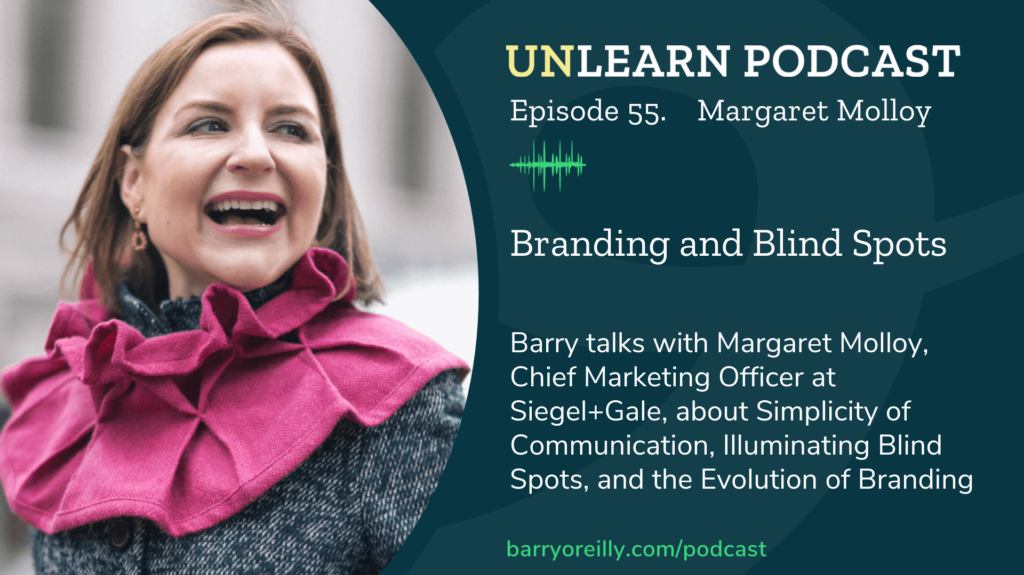Margaret Molloy and Barry O’Reilly connected by following each other’s podcasts and work. Margaret grew up in Ireland, and attended Harvard in the US. She currently serves as Chief Marketing Officer at Siegel+Gale, a leading brand strategy and design experience agency. She is a recognized leader in diversity and inclusion, and has built a global community around her How CMOs Commit podcast, as well the popular panels she regularly convenes.
Simple is Smart
“I study topics deeply to understand them profoundly, to be able to communicate them simply,” Margaret tells Barry. Being able to distill a brand to its essence and then communicate that in clear, simple language is very compelling, she argues. COVID-19 has only amplified the value of simplicity as it removes “cognitive tax” during this stressful time. “I believe the buying public will reward brands who truly appreciate the opportunity to remove that cognitive tax… Simplicity is just another way to say removing friction,” she remarks. Barry adds, “When you can create these simple, clearly understood messages, that’s what connects with people.” [Listen from 1:40]

Illuminating Blind Spots
It’s an act of courage and grace for someone to show you your blind spot. Understandably, it’s common for your first reaction to be defensiveness. This was certainly Margaret’s initial reaction to being told by an attendee that her gender-equal panel did not reflect ‘The Future of Branding’ as the name promised since it was not racially diverse. The experience challenged her view of herself and showed her that race was her blind spot. “Shortly after that I caught myself, and I realized I had just received probably the most constructive feedback I had ever received in my career,” she says. She had to unlearn her mental model of being color blind: she needed to be color brave. “Ever since that day I have worked to build my network and extend myself to make sure that I have diverse representation on our panels,” she points out. Interestingly, it was because someone else illuminated his own blind spot, and he learned from the experience, that the attendee felt inspired to pay it forward to Margaret. [Listen from 6:15]
(Listen to this podcast on The Future of Venture Company Creation with Mark S. McNally)
Distil the essence of your brand and then communicate that in clear, simple language.
From Defensiveness to Curiosity
It takes courage to listen to and accept feedback that’s “contrary to what you believe to be true of yourself”, Barry comments. He asks Margaret how she is able to get past defensiveness in those moments. “The heart and soul of it is curiosity, and what I’ve learned over the years is that curiosity and judgment can’t coexist,” she responds. Taking a posture of curiosity helps you move from judging yourself or defending your position, to growth. It’s really hard to take criticism in areas where you feel accomplished, she says, but being curious helps. “The older I’ve become, I’ve actually become more curious… The unlearning for me is that you don’t have to have all the answers. In fact, your impact is much more a function of your ability to frame good questions.” [Listen from 12:00]
The Evolution of Branding
Brand used to be about words and pictures, but now it’s about creating experiences that resonate with customers and the community. The pandemic has put a renewed emphasis on purpose. Margaret comments, “[Companies] are recognizing that having a brand purpose that’s distinctive and meaningful has many implications beyond the obvious potential for engendering customer loyalty. It’s also galvanizing employees. It’s attracting investors …and it’s helping them reimagine ecosystems where community, brands, and even public sector can collaborate for shared outcomes.” [Listen from 19:20]
(Read this blog on Innovation Freeze: Why Companies Are Losing Their Markets and Talents)
Margaret describes how Siegel+Gale works with their clients to design brand. She shares with Barry six questions that she poses to clients to help them define their brand:
- How prepared is your brand for this wave of stakeholder capitalism and focus on inclusive growth?
- How well do you understand what stakeholders value?
- Do you have a brand purpose that resonates broadly?
- How is your brand showing up?
- Do you know where your brand can travel?
- Do you have a plan for your brand to create value for all stakeholders and a plan to communicate the value? [Listen from 27:00]
Looking Ahead
Margaret believes that the evolution of brand as customer experience will continue to play out in the future. An aspect of this evolution will include how companies demonstrate their purpose and how customers discern their authenticity. She believes that forward-thinking marketers will shift focus from buyers to users in order to build community and ultimately, customer loyalty. She advises listeners to “look out for companies who build products out loud…” Barry agrees that the traditional paradigm of secrecy about upcoming product features and releases should be changed. It’s one of the reasons they founded Nobody Studios, he says. [Listen from 33:25]









